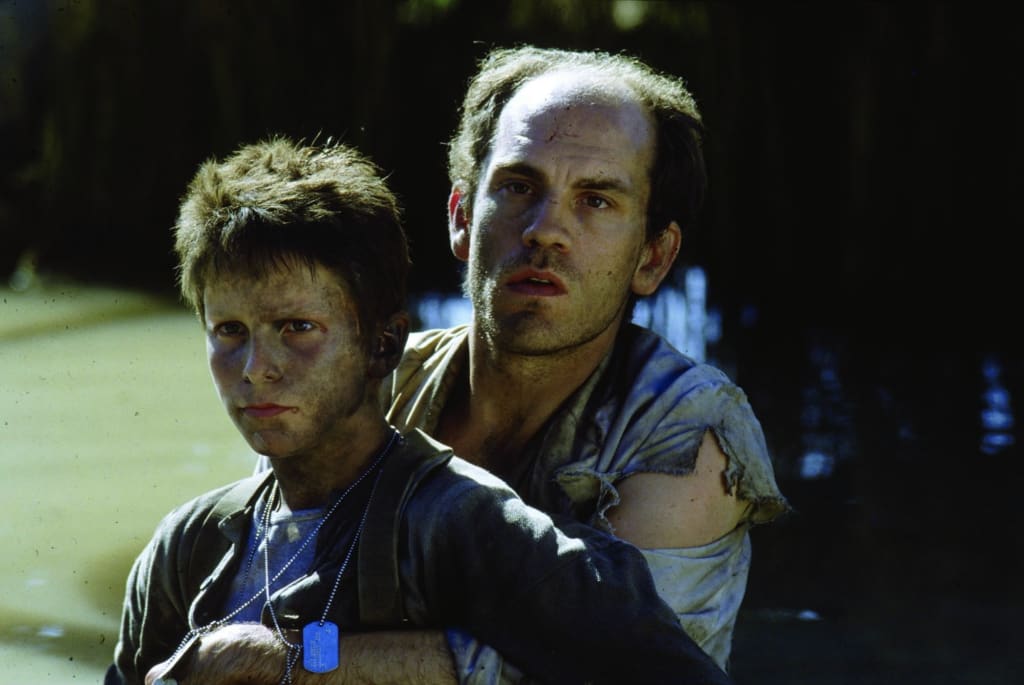Empire of the Sun (1987)
A review of the film based on J.G. Ballard's novel.

I've never read Empire of the Sun, although I've certainly read J.G. Ballard's other novels such as Crash and The Atrocity Exhibition. Watching the film of his semi-autobiographical novel, directed by Stephen Spielberg no less, it seems almost incongruous that we are examining the early life of the famed post-modern novelist, who began as one of the progenitors of the "New Wave" of science fiction literature in the Sixties, before turning his pen to an avant-garde exploration of violence, media manipulation, and modern dystopian themes of alienation, subversion, and control. He seems always to have been asking what the cult of celebrity meant, examining our modern society and media icons in the light of our terminal march toward self-obliteration and destruction. (But the reader may pick up Crash or Atrocity and genuinely ask themselves, if they finish the books, "What the hell was he really trying to say?")
Those considerations don't really enter into Empire of the Sun, which is a beautiful film starring a young Christian Bale in a performance quite beyond anything I've ever seen from a child before. Here is the first sign that Bale would go on to become one of the most extraordinary actors of his generation. He's so engaging in his role as little Jim Graham that it is hard to imagine he would go on, thirteen years later, to play the role that would define him in the minds of many of us: that of affluent Wall Street executive and brutal serial killer Patrick Bateman in Mary Herron's 2000 film adaptation of Brett Easton Ellis's famed transgressive horror masterpiece, American Psycho. Here, he is so fascinatingly, incredibly good, and complete in his portrayal of Jim Graham, the audience (or most of it) might well be thinking he deserved an Academy Award. And they would be right.
The film takes place during the Japanese invasion and occupation of mainland China between 1937-1945. Jim Graham is the son of a British businessman, a member of what was a community of arrogant expatriates, who treated their servants in the manner of "lessers," who imposed Britain and the West on a country not their own. Colonials, in other words. Jim follows suit, incurring the dislike of a Chinese maid, whom he tells, "You must do as I say," when she reprimands him.
Jim's heroes are the flying fighter pilots of the era, whom he reads of in the pages of Wings comic book, but when the Japanese bring the war to China, he has enough opportunity to see such planes flying overhead in real-life action--dropping bombs. It soon becomes, as the famous tagline for John Boorman's equally amazing film Hope and Glory stated, "A tale of a world at war, and a boy at play."
British colonials, in light of the Japanese invasion of Shanghai, attempt to flee in a catastrophic exodus in which Jim becomes separated from his parents. Thus begins his long, arduous odyssey, along the way of which he meets a rogue expatriate and presumed criminal named Basie (excellent, excellent John Malkovich), whose mild-mannered care for his young charge extends through the film, to the very end, Basie acting as a stand-in for Jim's missing father. The boy quickly develops an emotional attachment to him.
It is not long before Jim and Basie, captured by the Japanese, end up in an internment camp for British and American expatriates and POWs. Here, young Jim becomes a hustler and smuggler of much-prized goods and prison contraband, while the brutal Japanese commandant Nagata (Masatō Ibu) oversees life on a day-to-day basis. And, as might be expected, life involves a lot of starvation.
Above, Jim, still enraptured by the sight of flying "Corvettes of the air" exults as American bombers overhead fly over. He lives with a British couple, the Victors (Miranda Richardson and David Gale), and in a most telling scene, the husband and his wife, who at first does not like Jim, are seen scarfing insects out of sheer hunger. Jim, still a child, but rapidly adapting as a survivor, is still caught up in his dreams of being a pilot, his admiration of the aviators a factor of Ballard's real life that would extend into his later works--The Pilot, if we remember correctly, was one of the ever-shifting characterizations of The Atrocity Exhibition.
Nagata and the casual brutality of the guards are well-documented; Basie is beaten by Nagata almost to death for daring to shave and possessing soap.
The tough, handsome Basie shrugs it off but confesses to Jim that he is thinking of escape, not entirely convinced that the land outside of the barbed wire fence is truly land mined. Jim, in a child-like sense of longing for an adult friend that he can put his emotional faith in, opts for Basie, but Basie is not really suited to the role. The handsome rogue is no Han Solo; he doesn't rise to the level of the heroic under terrible circumstances; at heart, he will always be a self-centered, self-concerned scoundrel. But for a short time the audience wonders.
Basie is the "leader" in the American barracks. Jim is quickly granted entre to live with the Americans, committing an act of bravery by retrieving a suitcase full of "goods" (his dreams: fighter polite comics, photographs, a suitcase full of pre-war fantasies) while a Japanese guard lurks in the wetland marshes he is crawling through, the American internees looking on at him through a window. "Oh, this is a dead kid," says one of them, but Basie is quiet. He wants Jim to live, to survive; perhaps on some level, he feels for him. But it is a depth of personal feeling he is, finally, incapable of allowing himself. After this incident, Jim is accepted into the ranks with American-style salutes from the other men. He is no longer the privileged son of a wealthy English expatriate. "You're an American now, kid," Basie tells him. It seems to mean the whole world to Jim. Part of his dream has come true.
Another deep longing held within (and Jim is a child who carries through with admirable pluck and stoicism, only ever once evincing weakness of any kind the entire film) is to be able to revive the dead. He hammers mercilessly at the heart of a dead woman in the infirmary, trying to use CPR to bring her back. Later, when the woman half of the couple he has lived with dies in front of him, he tries again, almost in fury, to "bring her back," to cheat the Reaper, as it were, to turn back the impossible. (This occurs on a death march the Japanese force the prisoners on when they realize they have lost the war and the camp will be liberated.)
In the distance, he sees an amazing sight. An explosion of light, unlike anything he has ever witnessed before in his life. He assumes it is the woman's soul "going up to heaven." It is in fact the atomic bomb dropped on Hiroshima.
Ballard responded to what must have been a real longing within himself to restore life to the dead and dying around him by going home to England and studying, for a time, to be a doctor. "I've learned a new word today," he says at one point with near-mystic fascination, "atom bomb.' Here we see the roots of what would become Ballard's later literary fixations begin to form.
At the end of the film, Basie makes one final appearance, giving him, as the culmination of the film's running joke, a Hershey's bar ("Hey kid," he asks him, in the flat inflections of the American accent, "you want a Hershey's bar?" When Jim answers in the affirmative, Basie retorts, "So do I." But in the end, he comes through for him with this small, parting gift.), before driving away with other pirates, into the Chinese sunset. Jim has been completely transformed now; his shellshocked visage is that of a DP, a war orphan. Basie could not substitute for Jim's real father (played with detached reserve by Rupert Frazer). Ballard of course, survived the war. The trauma he suffered as an internee and a survivor of horrors and immense, life-threatening danger, is written on young Jim's features. Christian Bale gave the performance of a lifetime right out of the gate, at the tender age of thirteen, in a film the audience won't soon forget.
In the end, it was a journey inward, to test what he was made of, to transform him, just as much as it was a journey across the face of war-torn, occupied Shanghai and into the bowels of a cruel, merciless prison; evading death and maintaining his skyward dreams, as the sun set on the Empire. But not the one within.
About the Creator
Tom Baker
Author of Haunted Indianapolis, Indiana Ghost Folklore, Midwest Maniacs, Midwest UFOs and Beyond, Scary Urban Legends, 50 Famous Fables and Folk Tales, and Notorious Crimes of the Upper Midwest.: http://tombakerbooks.weebly.com
Enjoyed the story? Support the Creator.
Subscribe for free to receive all their stories in your feed. You could also pledge your support or give them a one-off tip, letting them know you appreciate their work.
Reader insights
Nice work
Very well written. Keep up the good work!
Top insights
Easy to read and follow
Well-structured & engaging content
Excellent storytelling
Original narrative & well developed characters
Compelling and original writing
Creative use of language & vocab
Eye opening
Niche topic & fresh perspectives
Heartfelt and relatable
The story invoked strong personal emotions
On-point and relevant
Writing reflected the title & theme






Comments (2)
Randy, The correct phrase that was given those bombers would be "Cadillac of the Sky". Corvette of the Air is incorrect. Fact checking such information is detrimental to good writing. Aside from that error, I enjoyed your article.
Excellent review. I didn't get to see the movie in my younger years. I may have to check it out. (If I can ever find the time, lol!)